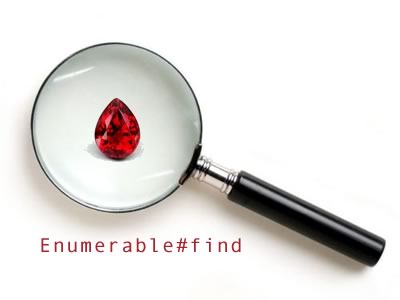
Welcome to the third installment in my series of articles on the methods of Ruby’s Enumerable module. This series is meant to address some of the shortcomings in the official documentation
In case you missed the first two, here they are:
In this installment, I’m going to cover the find method. This is a particularly interesting one because it covers detect/find‘s little-talked about optional parameter.
detect, a.k.a. find
Enumerable#detect / Enumerable#find- A block containing the criteria.
- An optional argument containing a proc that calculates a “default” value — that is, the value to return if no item in the collection matches the criteria.
- The first item in the collection that matches the criteria, if one exists.
- If no such item exists in the collection:
nilif no argument is provided- The value of the argument if one is provided
detect and find are synonyms — you can use either. I personally prefer find, as it’s shorter and a good match with a related method, find_all. I also just think that “find” conveys the method’s functionality much better than “detect”.
Using detect/find with Arrays
When used on an array without an argument, detect/find passes each item from the collection to the block and…
- If the current item causes the block to return a value that doesn’t evaluate to
false,detect/findstops going through collection and returns the item. - If no item in the collection causes the block to return a value that doesn’t evaluate to
false,detect/findreturnsnil.
classic_rock_bands = ["AC/DC", "Black Sabbath", "Queen", "Scorpions"]
classic_rock_bands.find {|band| band > "Led Zeppelin"}
=> "Queen"
classic_rock_bands.find {|band| band > "ZZ Top"}
=> nil
Using the optional argument is a topic big enough to merit its own section, which appears later in this article.
Using detect/find with Hashes
With hashes, detect/find passes each key/value pair in the hash to the block, which you can “catch” as either:
- A two-element array, with the key as element 0 and its corresponding value as element 1, or
- Two separate items, with the key as the first item and its corresponding value as the second item.
detect/find is one of those methods of Enumerable that works a little oddly since:
- The result it returns depends on the order of the collection
- We’re always told that hashes don’t really any order (there seems to be one, but it’s shrouded in mystery).
metacritic_ratings = {"Juno" => 81, "American Gangster" => 76, \
"Golden Compass" => 51, "Meet the Spartans" => 9}
=> {"American Gangster"=>76, "Golden Compass"=>51, "Juno"=>81, "Meet the Spartans"=>9}
metacritic_ratings.find {|metacritic_rating| metacritic_rating[1] > 80}
=> ["Juno", 81]
metacritic_ratings.find {|film, rating| rating > 80}
=> ["Juno", 81]
metacritic_ratings.find {|film, rating| rating > 90}
=> nil
Using detect/find with the Optional Argument
detect/find‘s optional argument lets you specify a proc or lambda whose return value will be the result in cases where no object in the collection matches the criteria.
(Unfortunately, a complete discussion of procs and lambdas is beyond the scope of this article. I highly recommend looking at Eli Bendersky’s very informative article, Understanding Ruby blocks, Procs and methods.)
I think that the optional argument is best explained through examples…
classic_rock_bands = ["AC/DC", "Black Sabbath", "Queen", "Scorpions"]
# Let's define a proc that will simply return the default band's name
# for cases where none of the bands in the array meets the criteria.
default_band = Proc.new {"ABBA"}
# Procs are objects, so using a proc's name alone isn't sufficient
to invoke its code -- doing so will simply return the proc object.
default_band
=> #<Proc:0x00553f34@(irb):31>
# (The actual value will be different for you, but you get the idea.)
# To call a proc, you have to use its "call" method:
default_band.call
=> "ABBA"
# detect/find calls the "call" method of the object you provide as the argument
# if no item in the collection matches the criteria in the block.
classic_rock_bands.find(default_band) {|band| band > "Led Zeppelin"}
=> "Queen"
classic_rock_bands.find(default_band) {|band| band > "ZZ Top"}
=> "ABBA"
# Let's try something a little fancier, and use a lambda this time.
# The differences between procs and lambdas are very fine -- I suggest
# you check Eli Bendersky's article for those differences.
random_band = lambda do
fallback_bands = ["Britney Spears", "Christina Aguilera", "Ashlee Simpson"]
fallback_bands[rand(fallback_bands.size)]
end
# Let's give it a try...
classic_rock_bands.find(random_band) {|band| band > "ZZ Top"}
=> "Britney Spears"
>> classic_rock_bands.find(random_band) {|band| band > "ZZ Top"}
=> "Ashlee Simpson"
>> classic_rock_bands.find(random_band) {|band| band > "ZZ Top"}
=> "Christina Aguilera"
To see a “real” application of detect/find's optional argument, see this Ruby Quiz problem.